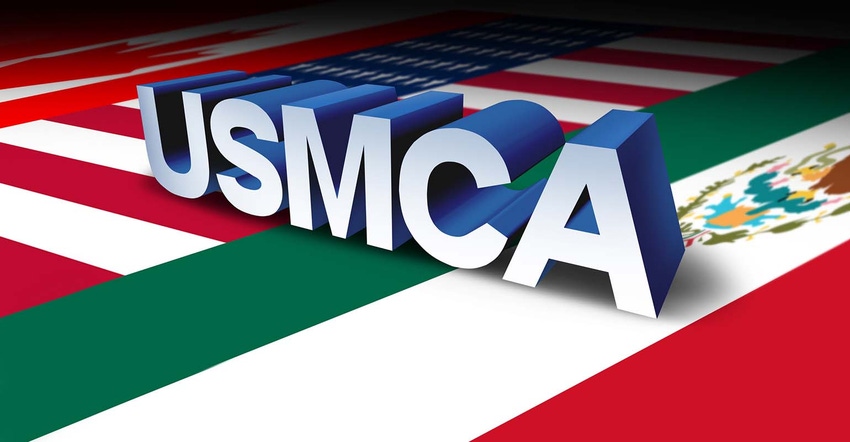Canada gives final clearance on USMCA
Updated North America trade agreement will take effect in 90 days.

Canada's House of Commons and Senate voted on Friday to implement the U.S.-Mexico-Canada (USMCA or known as CUSMA in Canada) trade agreement. It will only require royal assent from Governor General Julie Payette to become law.
The motion in the Senate was included as part of a package to adjourn until April 20. Canada's approval is one of the final steps towards implementation of the trade agreement.
In January, President Trump signed USMCA into law, which, once implemented, will provide much-needed certainty for U.S. agricultural producers. The Trump Administration is working toward a June 1, 2020 implementation of the agreement, but that date is not yet confirmed. The agreement will take effect 90 days after all countries have approved it. The time will also allow each country to determine if additional regulations are needed for governing the mechanics of the agreement.
Canada and Mexico are the first and second largest export markets for United States food and agricultural products, totaling more than $39.7 billion food and agricultural exports in 2018. These exports support more than 325,000 American jobs. All food and agricultural products that have zero tariffs under NAFTA will remain at zero tariffs. The USMCA is expected to increase agricultural exports from the U.S. by $2 billion and result in an overall increase of $65 billion in gross domestic product.
Dairy will have expanded market access in Canada, which eliminated its unfair Class 6 and 7 milk pricing programs under USMCA. These programs essentially allowed Canadian producers to undersell U.S. producers. In addition, U.S. poultry producers will have expanded access to Canada for their products.
USMCA provides U.S. pork producers with certainty in two of our largest export markets. In 2019, Canada and Mexico took in over 30% of the pork that was exported from the U.S. U.S. pork exports to Canada and Mexico support over 26,900 U.S. pork jobs.
Mexico is the #2 market for whole beans, meal and oil, and Canada is the #4 buyer of meal and #7 buyer of oil for U.S. soybean farmers, making the trade agreement essential to sustaining the growth realized in those two countries under NAFTA. Under NAFTA, U.S. soybean sales to Mexico quadrupled and to Canada doubled.
USMCA retains tariff-free access to imported U.S. wheat for those long-time flour milling customers in Mexico, a crucial step toward rebuilding trust in the U.S. as a reliable supplier in this important, neighboring market. In addition, the USMCA makes important progress towards more open commerce for U.S. wheat farmers near the Canadian border by allowing U.S. varieties registered in Canada to receive reciprocal grading treatment.
U.S. Grains Council (USGC) Chairman Darren Armstrong, a farmer from North Carolina, commented on the final agreement implementation. “Our leaders and members are thrilled to see the completion of the U.S.-Mexico-Canada Agreement's approval process and look forward to it entering into force.”
The agreement maintains zero tariffs on U.S. feed grains, co-products and ethanol; provides the highest enforceable sanitary and phytosanitary standards in any trade agreement to date; addresses regulatory equivalence, science and risk analysis, transparency and cooperative technical consultations; creates a rapid-response mechanism to address trade challenges; modernizes border procedures; and includes an enforceable biotechnology chapter – the first ever in a U.S. trade agreement.
“All told, we believe this agreement will solidify our most important and strategic trade relationships with our closest neighbors and best customers, and it will position our industry to continue to grow with our friends and partners in Mexico and Canada,” Armstrong said.
About the Author(s)
You May Also Like





